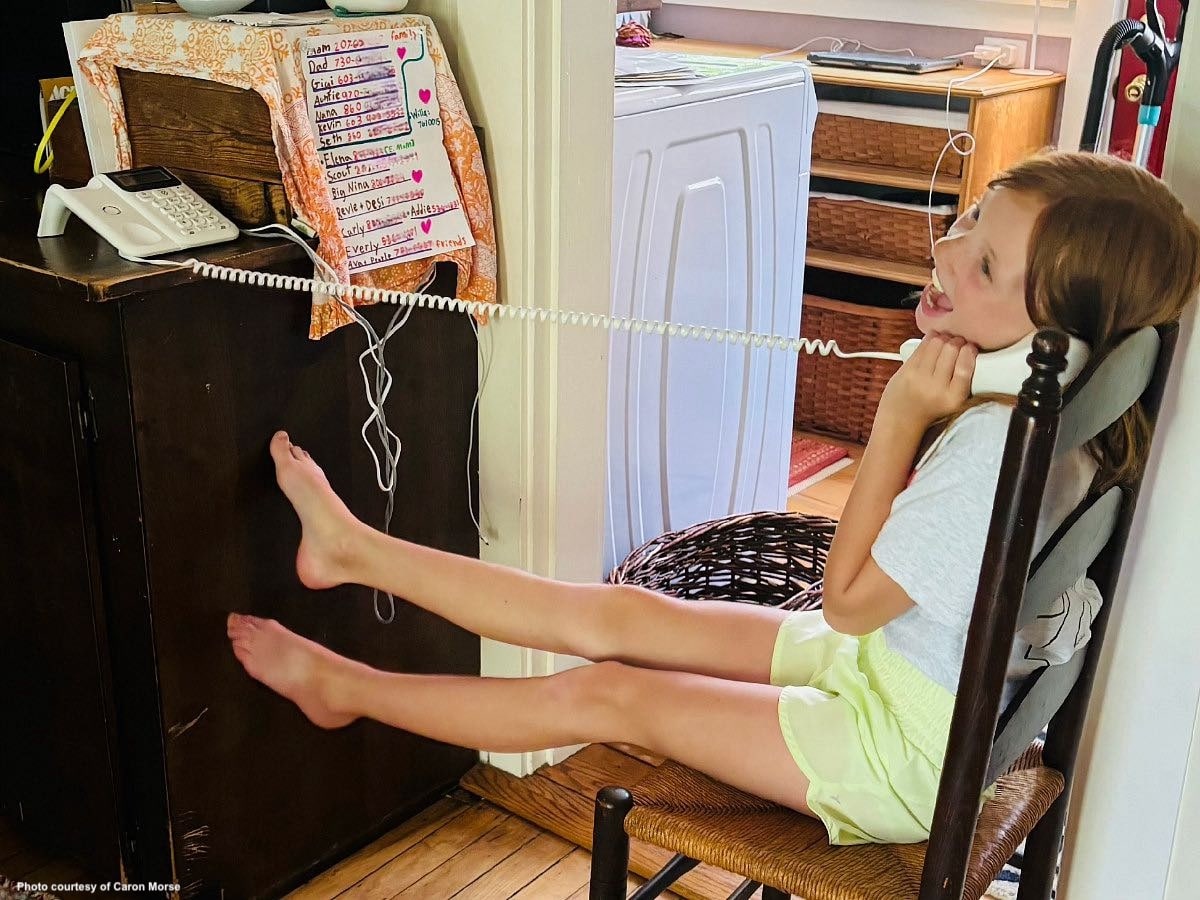Listen to the audio version of this article (generated by AI).
If your parents found out about your first crush by listening to that trembling voice on the landline, then you likely grew up with a home phone. Those awkward moments helped us build confidence, empathy, and meaningful connections. However, as parents today, we’ve largely forgotten about home phones. Yet, they are still an option — a choice, according to Caron Morse — if we want our kids to develop healthy social skills without the downsides of smartphones.
About a year ago, Caron Morse got a landline for her 10-year-old daughter, Molly, on her birthday. With the home phone, Molly could plan her own playdates in their South Portland, Maine, neighborhood without having to ask her mom to text or call the other parent. Morse provided her daughter with a way to connect with friends that didn’t involve her or require a screen.
But she needed other parents on board. It took about three to five months before neighbors began to replace smartphones with landlines. “Now we’re up to, I’d say, 20 to 30 friends who have chosen this path for a while,” she shared with me on a sunny morning over Zoom.
It was the first day of school after the summer holidays, and Molly had just been on the phone with her friend, Scout, who lives two houses away. They chatted about their excitement for taking the school bus for the first time. When they left their homes without phones in hand, their in-person social connection could deepen without the distractions of texting, apps, or social media.
Caron Morse, a fortuitous name that evokes the Telegraph inventor, is leading a movement that utilizes an old means of connectivity for children, without smartphones, to become better communicators, improve their social connections, and increase their independence and personal responsibility.
“Parenting is so intentional,” she stated. “There’s a reason why we, as parents, make certain choices. There are a lot of deliberate steps, a sense of nostalgia, and a greater purpose behind my decision to say ‘not yet’ to cellphones. And I’ve come to realize that this was the best parenting choice I have made yet.” Her words resonate with me; my son doesn’t have a cellphone and uses a landline to call his friends— on their mobile phones.
Morse is a licensed clinical social worker (LCSW), a mental health professional who diagnoses and treats mental, emotional, and behavioral disorders, and provides therapy and counseling in the public school system in Portland. Having worked at the same school for about 12 years, she has found it challenging to observe the negative impact of smartphones on children.
Connection is always on her mind. Morse often notices that kids at her school lack the drive to connect in the same way she remembers growing up. She explains that maintaining human connections is crucial as an antidote to depression and anxiety. “I wanted to ensure that my own children understand the importance of connecting with others. If you haven’t spoken to your grandparents in a couple of days, it’s important to call and check in. Likewise, reaching out to a friend who might be sick at home is just as important,” she says. Before the landline, Morse struggled to facilitate these connections for her daughters because she didn’t want them to take her cellphone and get lost in it.
As the only mental health provider at the school, she has noticed a significant decline in children’s social skills and a notable increase in their anxiety. She observes signs of depression and suicidal thoughts, often linked to what kids encounter on their cellphones — whether it’s a notification or a TikTok video they watched the night before.
Morse recounted a story about a parent who wanted to give her a heads-up. At a dinner party over the summer, there were three 9-year-old boys in the living room. One of the boys had a phone, and all the parents assumed they were merely looking at roadblocks or the like. However, later that evening, their son revealed that his friend with the phone was showing them porn. “It was just like, oh my gosh, why are we giving them the world in their hands? If we could only take that world away because their brains are not ready for it yet,” Morse laments. Given the observations of mental-health professionals like Morse, I wonder why parents seem to be grasping at straws.
Recommended Read: Growing Up in the City: What It Was, What It Can Be Again
In the bestselling book The Anxious Generation by Jonathan Haidt, Morse points out a section that discusses how parents are so focused on micromanaging their children that they are inadvertently taking away essential skills from them — namely, independence. By seeking peace of mind, parents want to ensure their children’s safety at all times. When kids request smartphones, parents often convince themselves that their children will be outcasts without them. However, neither the kids in South Portland nor my son are in such a situation.
Ten years ago, Morse and her family moved to their neighborhood. It is not a cul-de-sac; rather, the houses are situated along a main road. While the neighborhood is busy, it is a safe and tight-knit community where most families have children of similar ages. They host Halloween and Christmas parties and support one another during times of need, such as when someone is in the hospital. This dynamic has been ongoing for years. However, Morse noted that in such a close community, landlines were hard to sell at first. I asked Morse whether it shouldn’t have been the opposite, unless parents want cellphones for their kids as much as kids do.
Morse agreed, stating that “kids actually want to look up more and not be head-down so much.” Last summer, when her children saw her reading The Anxious Generation, she explained its content. Her eight-year-old, Piper, suggested that they place Morse’s cellphone on top of the fridge every Saturday, “now that we have a landline.” For the past four weeks, Saturdays have been designated as cell phone-free days in Morse’s home. “For my husband and me, phones go on top of the fridge, and it’s wonderful. Therefore, more to your point, I think kids prefer to be without smartphones,” she says. They also want independence.
Next year, when Molly starts middle school, she will take the bus to a school on the other side of town. There may be days when Molly wants to ride the bus to a friend’s house or needs someone to pick her up instead of taking the bus home. Morse contemplates getting her daughter a version of a watch with texting capabilities so they can communicate when she is away; once she’s home, she would store it in an electronic basket. This watch would only be useful when she goes out, in case they still don’t know how she would get home or what the pickup situation would be. She won’t have any friends’ contacts on that smartwatch — it will just serve as a means to reach her parents.
Morse believes this is a logical next step since the landline will still be effective for her daughters in communicating with their friends. She reminds us that, as parents, we still have other options for our kids without surrendering to smartphones. The simple fact of the matter is, fewer and fewer parents and kids believe that gadgets, social media, and apps are committed to the healthy development of our future generations. And once we know better, we do better for our children.





